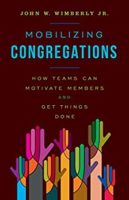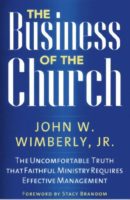
One of the most striking changes I have seen In my consulting work since 2012 is in how often congregations hire part-time employees. For everything from cleaning and building maintenance, administration, finance, program staffing, and pastoral care, I see part-timers doing work previously done by full-time staff. Some regret this; I think we should embrace it.
Congregations are not alone. The number of part-time workers in the U.S. workforce, as reported by Statista, has risen from 20 million in 1990 to almost 28 million in 2024. The share of the workforce that is part-time has risen to 17.5% in 2024. This trend didn’t start with COVID. It has gained steam since 2023.
While the part-time trend is recent in the secular workforce, it has been under way in congregations for quite a while. The Presbyterian Outlook reports that 45% of congregations in the United Church of Christ have no full-time clergy, compared with 35% in 2017. “In the Episcopal Church, 56% of clergy do not serve full time in one ministry setting.” It is difficult to find statistics on other church employees, but no doubt the part-time trend applies to them as well.
The Part-Time Trend
Why is this happening? Congregations’ financial struggles obviously drive some of the transition. But there are other factors, such as:
- Many things administrative assistants did in the past, pastors can now do themselves. Today there is little reason for an administrative assistant to type letters or sermon transcripts. The pastor can create documents, keep a calendar, find files, and more, using computers, apps, and networks.
- There is little reason to have people entering the same financial, membership, and attendance data in multiple places. With data management packages designed for congregations, staff and volunteers can enter data just once and have secure, remote access from anywhere. No more do staff need to walk into a treasurer’s office to ask how much money they spent last month—they can look it up on the server, working from home or at church.
- Most congregations need a part-time person to handle audio-visual tech on Sunday mornings and at other times. Few congregations can afford to hire a full-time A/V person . Instead, they hire a part-time person who may be self-employed or have other part-time jobs.
- If a church building is lightly used, a part-time person handling cleaning and maintenance work can be an ideal solution.
- Few congregations can justify full-time staff even in crucial program areas such as spiritual development/education, youth ministry, pastoral care, outreach, or music. But it’s often possible to attract a part-time person in in those areas. For example, a schoolteacher might enjoy an additional part-time job as a Christian educator. A person working in a local nonprofit might like to work part time to develop a church’s community ministry.
Some church leaders regard the use of part-time employees as a sign of failure, even as the practice has grown. “We used to have a full-time youth minister. Now we only have a part-time one.” “We used to have a secretary in the front office who greeted and helped us and made us feel valued. Now there is only an administrative assistant there a few days a week.”
To me, this is a case of yearning for what was when we should be adapting to what is and will be. Part-time employees bring specialized skills to tasks that require them. Long ago, as a full-time associate pastor, I often thought it would be more efficient to hire part-time specialists to do some of the things I did as a seminary-trained generalist.
Part-Timers Bring Focused Skills
A seminary education is a great thing. But a teacher versed in modern education theory and practice can take a congregation’s spiritual development/education program to a higher level. A person who works full-time with youth might fit a congregation’s youth ministry better than a seminary-trained clergyperson.
Some heads of staff think that part-time workers require different management skills than full time workers. But do they? The essence of managing humans is clarity of purpose—what is this worker supposed to do? What will the outcome look like? So long as legal and ethical boundaries are kept, How the person achieves the outcome is irrelevant.
We need to stop treating part-time employees as a breed apart. Part-timers succeed when they have the skills, work ethic, and team spirit to achieve the outcomes for which they were hired—just like successful full-time employees.
It is true that full-time employees may stay in place longer than part-timers. But “may” is the key word. Today’s employees move more often than they did in the past. We should enjoy each staff member’s time with us and maximize its impact, understanding that they may not be around tomorrow. Sad? Perhaps. True? I think so.
Living in a Part-Time World
Some won’t like this analogy: It used to be that college sports programs recruited a young person and developed them for four years. Not today—the transfer portal has changed everything. In like manner, we need to keep building and rebuilding church staff today. Get the most of them while they are around. When they leave, find another person with comparable skills and work habits.
“Necessity is the mother of invention” is a concept attributed to Plato. Part-time congregational employees are an invention—created, in many instances, by the necessity of limited financial resources. But can we not embrace this invention as a chance to hire people with better skills than we have hired in the past? We must!
John Wimberly is an experienced pastor and consultant. As a consultant, he has worked with congregations and judicatories on strategic planning, staff designs for the 21st century, and congregational growth as well as financial and administrative management. He has MBA, MDiv, and PhD (theology) degrees. His books focus on effective management and leadership. John believes congregations can have a bright future!



